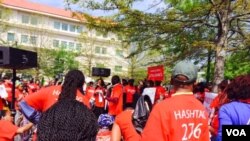The threat by the Islamist militant group Boko Haram to sell the scores of school girls it says it kidnapped three weeks ago has sparked outrage around the world and prompted calls for action.
The United States says it will send a team of experts to Nigeria to help in the search for the more than 250 girls and Britain is offering help as well. Eight more girls were reported kidnapped this week.
Meanwhile, rallies were held Tuesday in Washington and New York to press for their freedom.
They marched and brandished signs in front of the Nigerian Embassy in Washington, calling for action.
Nicole Lee, a human rights lawyer, said just because the kidnapping happened in Nigeria doesn’t mean people shouldn’t care.
“Everybody, no matter what our race or citizenship, needs to really care and understand that if it can happen there, it can happen here. Human trafficking is all over the planet,” said Lee.
Nigerian Omolola Adele-Oso, the lead organizer of Tuesday's rally, called on her government to do more.
“It’s your responsibility to keep your citizens safe. It’s also the responsibility of the government that everyone should get a fair education and not live in fear,” said Adele-Oso.
In a video released Monday, Boko Haram leader Abubaker Shekau claimed responsibility for the mid-April abduction of several hundred school girls and threatened to sell them.
"Just because I took some little girls in [getting a] Western education, everybody is making noise… I took the girls and I will sell them off," he threatened.
The announcement dismayed relatives and generated widespread outrage. U.S. Secretary of State John Kerry said Tuesday he spoke to Nigerian President Goodluck Jonathan and promised help.
“Our embassy in Abuja is prepared to form a coordination cell to provide expertise on intelligence and hostage negotiations and to help facilitate information sharing and victim assistance. President Jonathan was very happy to receive this offer and is ready to move on it immediately,” said Kerry.
Yet some Nigerians have been critical of the government, saying President Jonathan's administration has not done enough to secure the girls' release.
And for Nigerians living abroad, the frustration of feeling helpless is tangible. At a New York rally, there were more calls for action. Bukola Oreofe, executive director of the Nigeria Democratic Liberty Forum was among the participants.
“What [President Jonathan] has to do is summon his security agencies, his armed forces, the intelligence agencies and go after Boko Haram,” said Oreofe.
Nigeria just recently became Africa's biggest economy; outpacing South Africa’s. It hoped to highlight the sub-Saharan country's potential investment destination as it prepares to host its first World Economic Forum in a few days. But the event will most likely be overshadowed by the recent bombings and kidnapping incidents by the militant group Boko Haram. Right now what's trending on social media is not the WEF but the hashtag #BringBackOurGirls.
The United States says it will send a team of experts to Nigeria to help in the search for the more than 250 girls and Britain is offering help as well. Eight more girls were reported kidnapped this week.
Meanwhile, rallies were held Tuesday in Washington and New York to press for their freedom.
They marched and brandished signs in front of the Nigerian Embassy in Washington, calling for action.
Nicole Lee, a human rights lawyer, said just because the kidnapping happened in Nigeria doesn’t mean people shouldn’t care.
“Everybody, no matter what our race or citizenship, needs to really care and understand that if it can happen there, it can happen here. Human trafficking is all over the planet,” said Lee.
Nigerian Omolola Adele-Oso, the lead organizer of Tuesday's rally, called on her government to do more.
“It’s your responsibility to keep your citizens safe. It’s also the responsibility of the government that everyone should get a fair education and not live in fear,” said Adele-Oso.
In a video released Monday, Boko Haram leader Abubaker Shekau claimed responsibility for the mid-April abduction of several hundred school girls and threatened to sell them.
"Just because I took some little girls in [getting a] Western education, everybody is making noise… I took the girls and I will sell them off," he threatened.
The announcement dismayed relatives and generated widespread outrage. U.S. Secretary of State John Kerry said Tuesday he spoke to Nigerian President Goodluck Jonathan and promised help.
“Our embassy in Abuja is prepared to form a coordination cell to provide expertise on intelligence and hostage negotiations and to help facilitate information sharing and victim assistance. President Jonathan was very happy to receive this offer and is ready to move on it immediately,” said Kerry.
Yet some Nigerians have been critical of the government, saying President Jonathan's administration has not done enough to secure the girls' release.
And for Nigerians living abroad, the frustration of feeling helpless is tangible. At a New York rally, there were more calls for action. Bukola Oreofe, executive director of the Nigeria Democratic Liberty Forum was among the participants.
“What [President Jonathan] has to do is summon his security agencies, his armed forces, the intelligence agencies and go after Boko Haram,” said Oreofe.
Nigeria just recently became Africa's biggest economy; outpacing South Africa’s. It hoped to highlight the sub-Saharan country's potential investment destination as it prepares to host its first World Economic Forum in a few days. But the event will most likely be overshadowed by the recent bombings and kidnapping incidents by the militant group Boko Haram. Right now what's trending on social media is not the WEF but the hashtag #BringBackOurGirls.






